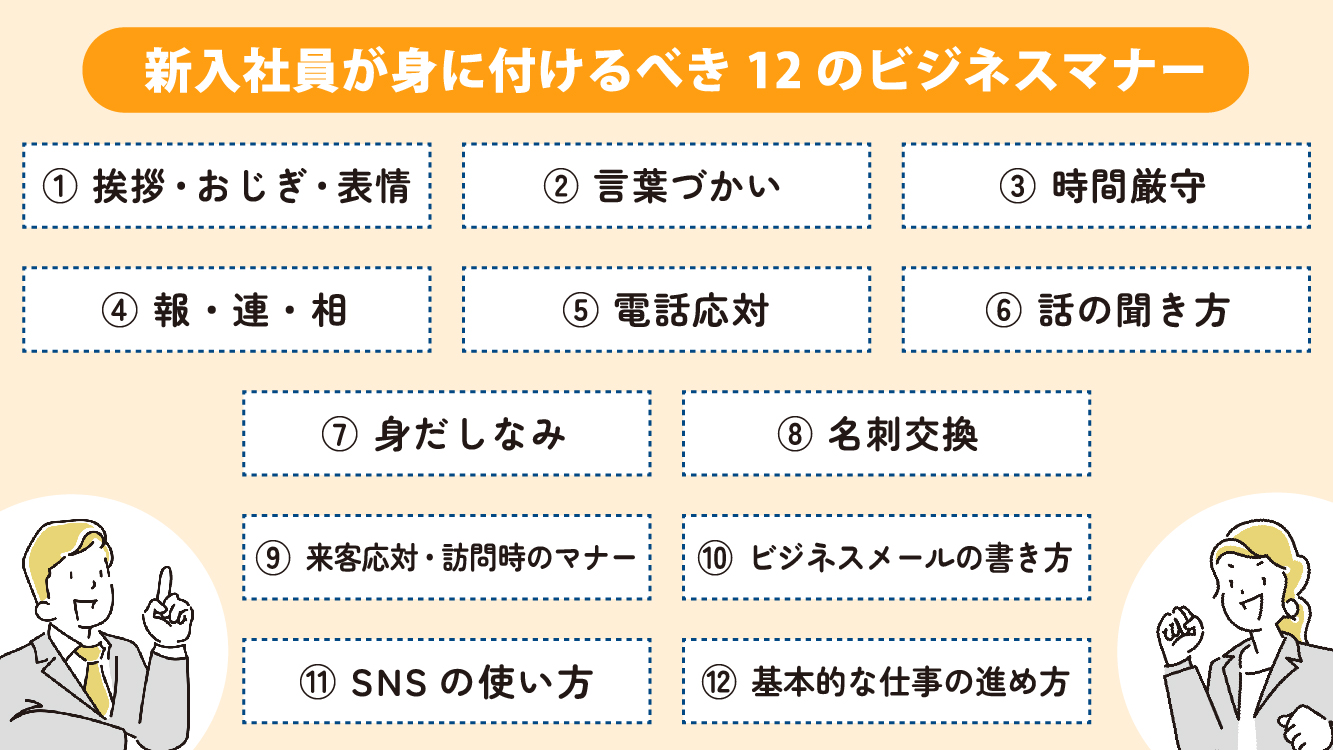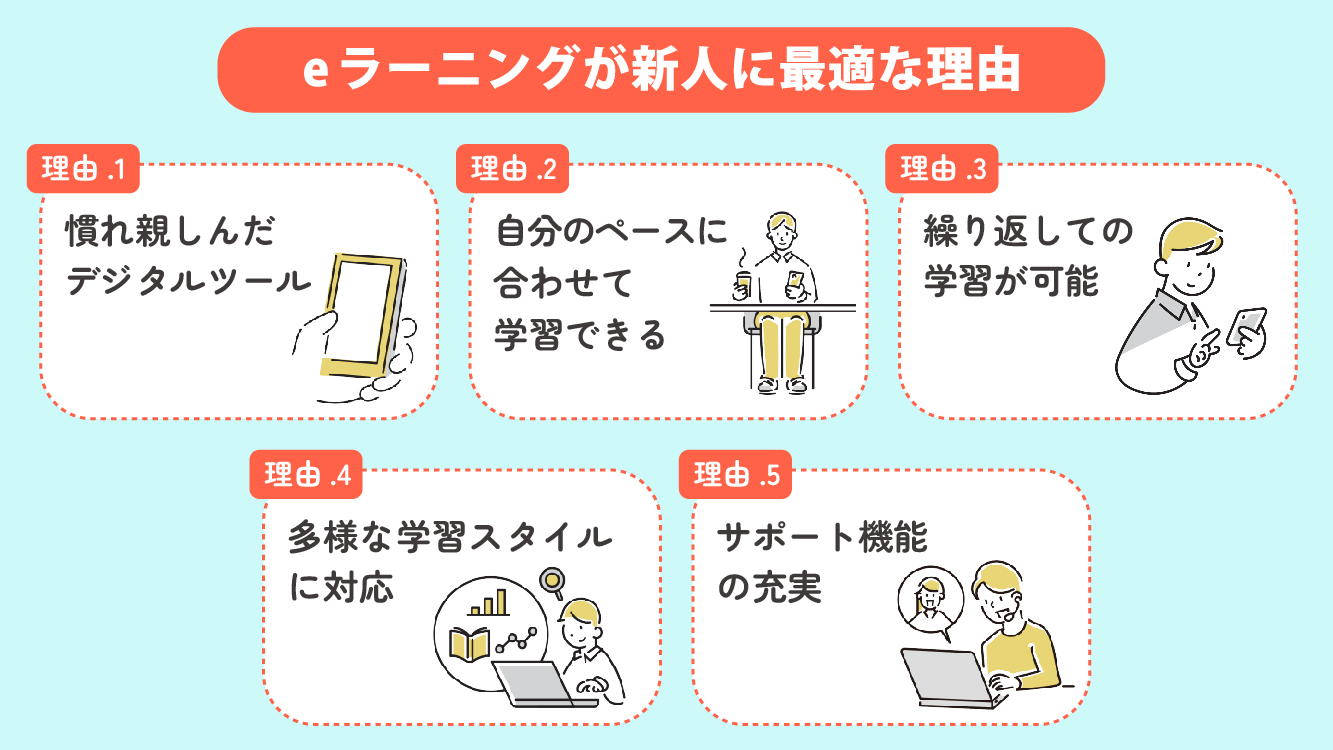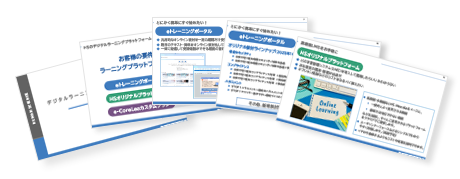2024.07.24
What business manners should new employees acquire during training? Introducing challenges in the development of new talent and ways to enhance effectiveness.

For newcomers who have just entered society, there are many skills to learn. Among them, the first skill to acquire is business etiquette, which is essential for building smooth interpersonal relationships. While specific professional skills can be learned through practical experience, business etiquette is directly related to relationships with others and the progress of work, so it is necessary to acquire it at an early stage.
This blog provides practical information useful in business settings, including an introduction to business manners that newcomers should acquire, challenges of business manners training from the perspective of administrators, and methods to enhance the effectiveness of training.
1. 12 Business Manners New Employees Should Acquire
Business etiquette training for newcomers is a training program designed to learn the basic business manners and etiquette required to perform work smoothly. The training typically includes courses such as the following.

1. Greetings, Bowing, Expressions
Learn basic greetings and bowing techniques (nod, salute, deep bow), create expressions that convey likability and trust, and enhance your communication skills.
Language Usage
Learn how to use honorifics, humble language, and polite language to appropriately show respect to others.
3. Punctuality
Learn the importance of enhancing reliability by being on time, such as not being late and acting as scheduled.
4. Report, Contact, Consult
You will understand the significance and basics of reporting, contacting, and consulting, and learn methods to enhance information sharing and problem-solving efficiency.
5. Telephone Handling
Learn the basic telephone manners in business, such as how to receive calls, make calls, and leave messages.
6. How to Listen
You will learn how to build trust by listening carefully to the other person's story and showing appropriate reactions.
7. Appearance
Maintain a clean and tidy outfit and hairstyle, and learn to present an appearance suitable for business scenes according to TPO (Time, Place, Occasion).
8. Business Card Exchange
Learn the basics of business card exchange, including how to give and receive cards, and the correct storage methods.
9. Visitor Reception and Etiquette During Visits
Learn how to greet and guide visitors, as well as the etiquette to observe at the destination, to create a positive impression.
>Is customer service training necessary for newcomers? What are the necessary responses as business manners?
>What business skills should be taught in etiquette training for new salespeople? Essential for sales accompaniment and online meetings.
How to Write Business Emails
You will learn how to write clear and polite business emails, including the structure of the subject and body, the use of honorifics, and appropriate expressions.
11. How to Use SNS
Learn the basic knowledge and risks of SNS, and understand the correct usage methods, including privacy protection, appropriate posting content, and how to utilize it in business.
12. Basic Work Procedures
To work efficiently, you will learn how to prioritize tasks, plan projects, and manage tasks.
During student days, there are many interactions with peers, which can lead to casual remarks and responses. However, once you enter the workforce, you will encounter a variety of people in different positions, such as supervisors, senior employees, and clients. Additionally, you will need to act not just as an individual but as a member of your organization, making it important to acquire appropriate manners. Mastering the manners explained above will help build trust both inside and outside the company, leading to increased efficiency and prevention of troubles.
2. New Employee Business Etiquette Training Tasks

Business etiquette training is an important step for newcomers to smoothly adapt to the workplace and their duties. However, from the perspective of management, there are several challenges.
This chapter introduces the main challenges that managers face regarding business etiquette training.
Issue 1: Form and etiquette often take precedence, leading to a loss of significance and purpose
In business etiquette training, formal manners are often emphasized, using examples such as the correct angle for bowing and the procedure for exchanging business cards. As a result, learners tend to perceive "business etiquette = formality," making the significance and purpose of why these manners are important and how they can be beneficial in business unclear. Consequently, they only acquire superficial etiquette, making it difficult to apply in actual work situations.
Issue.2: Low learner motivation and lack of proactivity
This overlaps with the content of Issue.1, but if learners do not understand the significance of business etiquette training and perceive it as merely formal, they tend to fall into the mindset of "just memorizing manners," which leads to a decrease in motivation for learning. Furthermore, if the training style is centered on one-sided lectures or lacks practical elements, it can also lead to a decline in learners' enthusiasm and cause a lack of proactivity.
Issue 3: Administrators cannot confirm the effectiveness of training, resulting in neglect
Business etiquette often has many aspects that are difficult to measure quantitatively, making it challenging to confirm the effectiveness of training. Additionally, without providing feedback on learners' behavior and job performance after training, it is impossible to understand how effective the training has been. As a result, there is a risk of overlooking learners who need re-education and leaving the situation as it is.
To solve these challenges, it is necessary to adjust the training content, devise ways to enhance the motivation of participants, and provide follow-up to encourage review and self-study. Specific methods will be explained in the next chapter.
3. Ways to Enhance the Effectiveness of Business Etiquette Training for New Employees

In the previous chapter, we touched on various issues related to business etiquette training.
In this chapter, we will introduce methods to resolve those issues and further enhance the effectiveness of the training.
1. Clearly communicate the purpose of "Why is it necessary to learn this?"
By understanding the purpose, newcomers can more easily realize how the training content will benefit them. Furthermore, they will not only memorize the training content but also adopt an attitude of applying and incorporating it, which is expected to enhance their motivation to learn.
Not just classroom training, but also showing actual examples
Since it is difficult for newcomers to imagine how to act based solely on classroom training, showing examples is key. In this case, let's assume real business scenarios such as phone handling and business card exchanges, and have supervisors or senior employees demonstrate. This allows for a more concrete image to form, helping to develop practical skills and responsiveness. It is also an advantage that mistakes and questions can be resolved on the spot.
Utilizing Feedback
It is also important to provide appropriate feedback after training. While praising the strengths of newcomers, it is essential to point out specific areas for improvement and advise on what to do next. This allows newcomers to feel their growth and fosters a desire for further improvement.
Learn with Customized Materials and Courses Optimized for Your Company
Customized materials and courses optimized for your company enhance learning efficiency by providing highly relevant information for newcomers. Furthermore, by incorporating specific examples and scenarios tailored to your company's operations and workplace realities, practical skills can be acquired more effectively.
5. Consolidate Knowledge through e-Learning Review and Self-Study
By incorporating e-learning, a learning method that is not restricted by time or place, you can learn business etiquette even during commutes or in spare moments. Additionally, the use of interactive materials such as videos and quizzes makes learning enjoyable. However, since business etiquette requires flexible communication skills, it is effective to use e-learning as a tool for review and self-study in conjunction with practical learning methods such as role-playing.
By combining methods like these, we can expect an improvement in the learning effectiveness of business etiquette training. Furthermore, by adding self-study utilizing e-learning, knowledge can be steadily retained, allowing newcomers to confidently acquire business etiquette.
4. E-learning is the ideal learning tool for new employees
In the previous chapter, we mentioned that e-learning is effective in business etiquette training. For newcomers, e-learning can be considered one of the user-friendly learning tools.
The reasons for this are as follows.

1. Familiar Digital Tools
Modern newcomers are part of the digital native generation, having been accustomed to the internet and digital tools from a young age. E-learning is provided online, making it a familiar learning environment for new employees.
Learn at Your Own Pace
New employees who have just entered the workforce may take time to adapt to the work environment and tasks. Additionally, immediately after joining, there may be various training sessions that can be stressful. In this regard, e-learning allows for learning at one's own pace, enabling efficient learning in short periods even amidst busy work schedules.
3. Repeat Learning is Possible
E-learning allows you to review the content you have taken as many times as you want. This makes it easy to revisit areas where understanding is lacking and to relearn at your own pace, thereby promoting knowledge retention. For newcomers who have a lot to memorize, e-learning can be a strong ally.
Support for Diverse Learning Styles
E-learning offers a variety of content, such as videos and animations. New employees belong to a generation that is highly compatible with these formats, allowing them to choose a learning style that suits them from various materials and enjoy the learning process. Additionally, by incorporating interactive elements like quizzes and simulations into e-learning, it is also possible to acquire knowledge and skills in a game-like manner.
5. Enhanced Support Features
Many e-learning platforms come equipped with learning support features. Through chat, forums, and FAQs, there is an environment where newcomers can immediately ask questions if they have any uncertainties, allowing them to engage in learning with peace of mind.
By utilizing e-learning for training new employees in this way, many benefits can be obtained. As a result, it is possible to effectively support the growth of new employees.
5. Summary

For newcomers, mastering proper business etiquette not only helps them acquire the basic manners and mindset required as professionals, but also boosts their confidence, reduces stress, and aids in their early adaptation to the workplace. Additionally, for companies, having newcomers become accustomed to their tasks and contribute as part of the team leads to overall performance improvement for the organization.
In this way, business etiquette training for newcomers is a "valuable investment" for both individuals and companies, and its effects will be significant even when considered in the long term.
At Human Science, we offer e-learning materials for business etiquette training tailored to various business scenarios. Among these, "Business Etiquette Basics: Foundation Edition" clearly explains essential business skills that every professional should remember first, including the mindset of a working adult, how to create a positive first impression, and basic approaches to work.
For more details, you can also visit the e-learning site of Human Science.
>e-Learning Material "Fundamentals of Business Etiquette: Basic Edition"
Additionally, please feel free to contact us for any inquiries or consultations regarding the implementation of e-learning.












